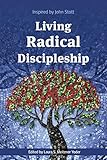John Stott believed strongly in mutuality and reciprocity within the global church. Though a son of the Western church, Stott, like the apostle Paul, was passionately committed to the worldwide body of Christ. He not only knew and loved so many church leaders in many denominations outside the West, but he also wanted to enable their voices to be heard, to affirm their leadership, and to facilitate the development of their giftings, academically and spiritually. “We must be global Christians,” he used to say, “with a global vision, because our God is a global God.”
I have sometimes said that John Stott was both apostolic and Abrahamic. There was something apostolic about his evangelistic commitment to the gospel and to the faithful teaching of biblical truth. And there was something Abrahamic about his “all nations” perspective. Not only was he himself a blessing to many nations; he also modeled and taught the “obedience of faith” (to quote Paul) that characterized Abraham’s combination of faith demonstrated in works (Rom. 1:5, ESV; James 2:20–26).
So for John Stott, to strengthen the leadership of the church outside the West would be to strengthen global church leadership, including the West. He prayed and longed for the greater health and maturity of the worldwide church, including the West. So whatever he could do to strengthen the Majority World church, the whole body of Christ would benefit.
Stott recognized an additional benefit that would adorn the truth of the gospel. As the leadership of the global church outside the West was strengthened, resourced, and recognized, then the truly international, multicultural nature of the church itself would be far more visible and more in line with the biblical portrait of the church.
We who are Western Christians need help. We need to acknowledge that we are the minority church in global terms. We need to recognize the vast and alarming extent to which, like the people of Israel before the Exile, we have succumbed to a range of idolatries and syncretisms—“going after the gods of the people around us” (to paraphrase the frequent warnings of Deuteronomy). We should be lamenting the way many who profess to be Christian succumb to frightening collusion with political leaders and policies that bear no resemblance whatsoever to the teachings and demands of Christ.
It is from Asia, Africa, and Latin America that God is already raising up leaders, scholars, thinkers, writers, and preachers who can speak with the authenticity of their contexts (and especially the authenticity of suffering for the Word of God and the testimony of Jesus Christ) into the moribund churches of the West. And some of those emerging (and already fully emerged and established) leaders are undoubtedly part of the fruit of John Stott’s vision and initiatives, including the Langham Partnership, which equips and publishes theologians. As Tim Keller has said in commending Langham’s work, “John Stott foresaw the rise of Christianity in the Global South before most anybody. He got there and saw the need for training. … This ministry has been a game changer.”
So there is, in my view, a rather delightful irony about how John Stott’s vision has turned out. His initiatives for theological education and literature were initially born of his desire that the well-resourced Western church should come alongside the underresourced churches of the Global South with generous assistance. But in God’s long-term providence and the grand sweep of church history, there will most likely be a reverse impact. Stott’s efforts will have helped to empower and equip the non-Western churches to come to the aid of the Western church in its decline.
We in the West are already finding ourselves the recipients and beneficiaries of the spiritual, missional, and theological leadership in the non-Western church that is in part the fruit of such investment over decades.
Adapted from Living Radical Discipleship, edited by Laura S. Meitzner Yoder, Langham Global Library, Carlisle, UK (2021). Available at langhamliterature.org.













